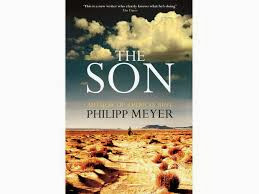
THE SON is a sweeping novel of the history of Texas. It follows three members of a single family across three generations. The only truly successful character is the grandfather. This is largely because his story is by far the most interesting. As a young man he is captured by the Comanches, who apparently frequently adopted captives into their tribe. He is one of them until they are wiped out by the Europeans, at which point he returns to his people, and becomes fabulously wealthy. I learnt a lot about Native American life from his story. As for example, this, on arrows:
The best shafts were grooved along their length. We used two grooves and the Lapan used four. This prevented the arrow from stanching the wound it had just cut, but it also kept the shaft from warping. The blades of hunting arrows were fixed vertically, as the ribs of game animals are vertical to the earth. The blades of war arrows were fixed parallel to the earth, the same as human ribs. Hunting points were made without barbs and tired tightly to the shaft so they could be pulled from an animal and reused. War arrows had barbs and the blades were tied loosely, so that if the arrow was pulled, the head would remain lodged in the enemy’s body.
It was also interesting to hear a view of what it must have been like to see the entire society collapse. As the white people don’t seem to know anything – about growing maize, or killing buffalo – the Comanche are mystified as to why they are not succeeding in killing them: “Toshaway always said that white women laid crops of eggs like ducks, which hatched every night, so it didn’t matter how many you killed.”
The grandfather character is also successful because it is told in the straight-forward third person. The story of his son is unfortunately in diary format, which is rarely successful in any novel, and is certainly not so here. In addition, the son is suspiciously modern in his views. Here he is on Mexicans: “Nearly pointed out that we are wetbacks, having swum our horses across the Nueces a century after the Garcias first settled here.”
The final character is the granddaughter. Her entire story is a flashback told as she lays dying OH DOUBLE DEAR, IT’S WORSE THAN THE DIARY THING. But I’m glad they managed to squeeze a daughter into THE SON; there is only so much testosterone one can handle in a single book, and this novel is dripping with it. It’s yet another of these laments for a lost West, of which I seem to have read a lot recently, which is deeply tied up with mourning for some kind of idea of masculinity, about which I can only say: meh.
